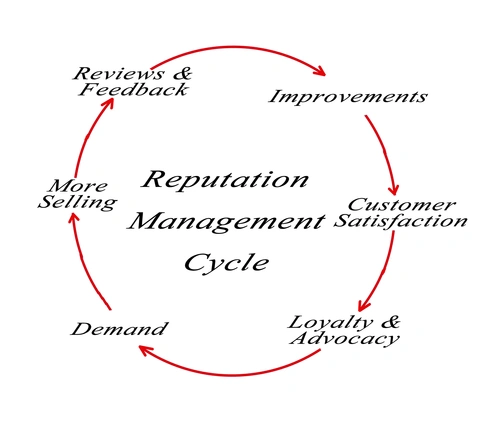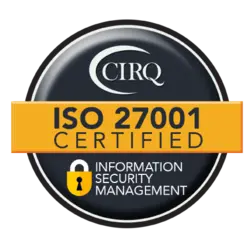Your B2B Brand Reputation and How To Manage It
By taking specific actions you can create a vital feedback loop that will incorporate all types of brand feedback to make timely decisions to grow and develop your B2B brand.
Your B2B Brand Reputation and How To Manage It
B2B customers are the same people who go online to get information about and then review retailers, physicians, auto dealerships, and all the other businesses they interact with. They, of course, bring those behaviors with them to the B2B world. And in addition to customers, B2B brands are also challenged by other forces, such as existing and emerging competition, changing regulatory environments, and economic pressures. Therefore, in a time when information – positive and negative – can be distributed and shared across the globe as quickly as you can press “send,” continually and devotedly monitoring and managing your B2B brand reputation online and offline is fundamental to business success.
Here’s why: A Deloitte survey reports that on average more than 25% of any company’s market value is directly attributable to its brand reputation. It is even more critical for B2B companies. According to G2, a business services review site, 94% of B2B buyers say reviews are important in their purchasing decision, and 80% of B2B software users switch providers within two years because of poor experiences. Further, Gartner reports that 64% of buyers who feel a high connection with a brand are more willing to pay a premium price for its products and services.
B2B buyers are driven to make investments that will succeed and reflect well on their organization. Many of these investments require a long-term contract with a sizable financial commitment. If B2B buyers don’t want to rely solely on their salesperson solely, who can they rely on? Their peers. And that is why B2B customers overwhelmingly count on product reviews. Then, if most B2B purchasers switch vendors frequently, you must monitor your brand reputation to gather insight into how to improve to retain customers longer.

Back to Basic: What is Your Brand Reputation?
There are four key contributors to your brand reputation: two from your side of the equation and two from the customer’s side:
- The first input is what you say about yourself, including your brand, products and services, heritage, vision, mission, culture, goals, and priorities.
- The second input is what you do and how you act and behave in the marketplace, including how you treat customers and employees and your corporate social responsibility.
- Next is what the customer sees and hears about you from their colleagues and friends (word-of-mouth), reviews, social media, discussion forums, and industry advocates.
- Finally, the B2B customers’ individual experience with your company, brand, products, and services forms the fourth input to your B2B brand reputation.
The goal is to make sure that perceptions and experiences match what you want to convey to the B2B customer and be able to identify and ameliorate any harmful or threatening situations early and quickly.
B2B Brand Reputation Management
Managing your brand reputation has two important aspects. First, the immediate, short-term impacts can be seen in the day-to-day posting of reviews and on social media. The second is the longer-term evaluation of how your brand is perceived by a more general audience of customers, prospects, and lost customers through brand tracking surveys. Think of the first as your “early warning system” while the second gives you a broader view of the marketplace, including how you stack up to your competition.
Whether online or offline, short-term, or long-term, the process of monitoring and managing your B2B brand requires a five-step approach:
- Monitor. Establish a process that will allow you to find all references to your brand online quickly. Conduct a brand tracking survey and solicit open-end feedback and questions.
- Address. Not all references need a response, but make sure you address those that do. Either escalate the comment or review to the appropriate person for a response or acknowledge the comment as it is received.
- Respond. Always be empathetic, authentic to your brand, and solution-oriented. Apologize when appropriate.
- Leverage and Multiply. Use reviews, comments, and verbatim responses to surveys in your social media, website, and marketing communications. Tag them in your response to customer queries. Make sure any references are recent and real.
- Encourage. Get more feedback. Get satisfied purchasers to post reviews.
By taking these five steps, you can create a vital feedback loop that will incorporate all types of brand feedback to make timely decisions to grow and develop your B2B brand.

The Importance of a B2B Brand Tracking Survey
Unlike online feedback and reviews, B2B brand tracking surveys are designed to have uniform metrics to benchmark and compare the results over time both across your target customers and against the competitors’ customers. The key metrics typically include questions that evaluate the organization overall and on a handful of critical dimensions. There is also an opportunity to provide open-ended feedback so that the organization can understand the top concerns of stakeholders that they want to see addressed. Monitoring your B2B brand perceptions through a tracking survey lets you see how things change and improve and whether your short-term brand-building efforts are working. A brand tracking survey may also unearth insights that can help you get ahead of the market with product innovation and development ideas.
B2B Brand Reputation Management in a Crisis
No one likes to think about problems, but business is about managing risk. In the event of a crisis, the good news is that having a B2B brand reputation management process can help you manage your brand through the situation more quickly and decisively.
Information becomes even more valuable when a crisis strikes. The data you have been collecting through your B2B Brand Reputation Management System becomes a benchmark for comparison to information about the brand in the post-crisis situation, showing exactly how much damage the crisis has done to the B2B brand and with which audiences. Additionally, tracking surveys can show the extent news about the brand and communications from the organization have spread to key audiences. Subsequent monitoring and brand tracking surveys can then demonstrate if and how the B2B brand is recovering and the influence of organizational communications efforts.
Summary
Brand Reputation Management is not new, but with today’s “always-on, everyone-shares” environment, it is rapidly becoming a practice that is more important than ever. A business with a proactive, rather than a reactive, approach to B2B Brand Reputation Management will prosper in good times and be better off in tough times, as well.
Follow
OvationMR

Need help with new insights?
We are ready to offer you:




